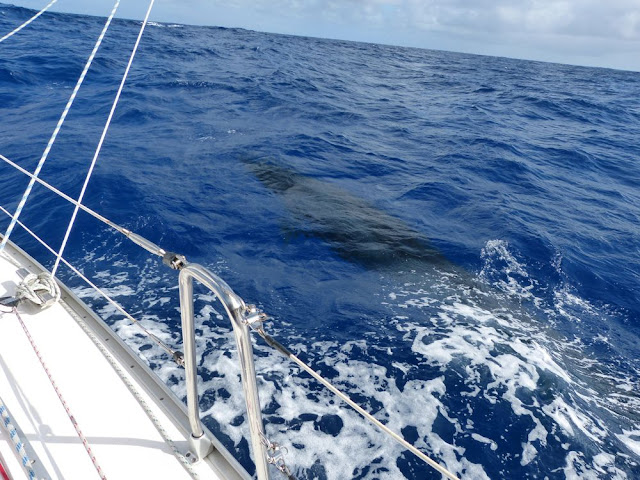on the way into the very protected bay of neiafu, we were rewarded for 8 days at sea by probably one of the most stunning sceneries we have seen so far on our trip.
the vava'u group is simply beautiful with lots of small overgrown with green islands dotting calm waters and beaches surrounding their shores
and as if organised by the ministry of tongan tourism supporting yachting a humpback whale swam past our boat gliding through that deep blue water.
first thing we had to go through, as always when entering a new country, was clearing in. this time we had to see 4 officials: quarantine: being a very friendly guy, asking us what kind of vegetables we have on board and asking us kindly not to bring it on shore, he stayed about an hour with us having a cup of coffee and telling us about tonga - health: being even friendlier - staying even longer telling us even more - immigration: we had to visit him and he was as well super nice - and last customs, who came on our boat again and could not believe we had folding bikes stored under our bed until we showed him.
we then picked up a mooring buoy as the waters are very deep here, had a quick shower and a great meal on shore. my fish burger was the best i ever (EVER!!!) had.
a few glasses of wine, lots of laughs with Charles, Heather, Luca and Isabella of Chilli Cat - a rainy dinghy ride back to the boat and we fell into a well deserved deep sleep in a completely still boat after only having had 2h sleep the previous 36h.
the first little walk through neiafu gave me the impression that this is as close you can come to australia without actually being here. neiafu looks like a little north australian town reminding me of places like cooktown - the little sheperds pie mark had for lunch did definitely help that impression.
people are incredibly friendly here (don't think it is due to craving our ham these days;)) still wearing traditional clothing mixed with normal western street wear. the official uniforms for males, also school uniforms for boys are a shirt and a wrap around skirt, women and men often wear leaf mats or pareos.
after being in spanish and french countries we enjoy being able to communicate with the locals as everyone speaks very good english as well as their mother tongue tongan.
in the spanish speaking countries all the officials winced at our boat name with "malo" meaning "very very bad"
so far all the people we told the name of our boat told us how nice a name we picked with "malo" meaning "thank you" in all of polynesia but especially with "maloo" meaning "very very calm and beautiful" in tongan.
so far the first impression is wonderful and i can't wait to explore further. within 24h i have fallen in love with tonga...let's see if it will be a quick flirt or a long lasting relationship ;)
in total it has been a demanding 1300nm from bora bora to tonga leaving us with the feeling we were longer out there than just 8 days.
we did not have to use the engine at all, saving lots of our duty free fuel from french polynesia.
but even though the conditions were not the easiest, we had a great time and are grateful we did not break anything.
maloo proved again to us to be a real ocean voyager not just a puddle duck and we are extremely proud of our floating home who got us here safe and sound and fast.
a highlight were definitely our daily visitors in the last 4 days. we meanwhile have learned that whale number one - by far the biggest - was a fin whale where as the others were most likely sei whales... being the third biggest baleen whales on earth. we were incredibly lucky to see them as not every boat sailing here got visitors.
a little bitter taste lingers though when i think about the japanese fishing boats we saw on our trip going in "stealth mode" without ais.
the tongan officials told us about the problems they have with the japanese fleets fishing illegally huge quantities of fish and unfortunately hunting whales in tongan waters.
with tonga being a poor country, there is only one patrol boat to check on territorial waters once a month.
the lack of the ability to protect their own waters almost seems like an invitation for foreign fishery fleets to exploit.
as tonga signed the whale protection legislation they sometimes get help by australian or new zealand coast guards, which is great but not nearly enough as also these big comparatively rich countries have the same problem with illegal fishing and whale hunting of foreign fleets.


